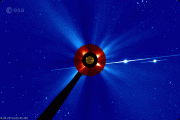
Copernical Team
NASA studies crops, forest response to changing rainfall patterns
 A new NASA-led study has found that how rain falls in a given year is nearly as important to the world's vegetation as how much. Reporting Dec. 11 in Nature, the researchers showed that even in years with similar rainfall totals, plants fared differently when that water came in fewer, bigger bursts.
In years with less frequent but more concentrated rainfall, plants in drier environments li
A new NASA-led study has found that how rain falls in a given year is nearly as important to the world's vegetation as how much. Reporting Dec. 11 in Nature, the researchers showed that even in years with similar rainfall totals, plants fared differently when that water came in fewer, bigger bursts.
In years with less frequent but more concentrated rainfall, plants in drier environments li AI advances unlock 3D cloud mapping from satellite data
 ESA's EarthCARE satellite, launched in May 2024, is approaching the end of its commissioning phase, with its first data release on clouds and aerosols anticipated early next year. Meanwhile, an international team of scientists has leveraged artificial intelligence to transform existing satellite data into groundbreaking 3D cloud profiles.
Clouds are central to Earth's climate system, influ
ESA's EarthCARE satellite, launched in May 2024, is approaching the end of its commissioning phase, with its first data release on clouds and aerosols anticipated early next year. Meanwhile, an international team of scientists has leveraged artificial intelligence to transform existing satellite data into groundbreaking 3D cloud profiles.
Clouds are central to Earth's climate system, influ A connection between quantum theory and information theory demonstrated
 "Our results have no clear or direct application right now. It's basic research that lays the foundation for future technologies in quantum information and quantum computers. There's enormous potential for completely new discoveries in many different research fields," says Guilherme B Xavier, researcher in quantum communication at Linkoping University, Sweden.
To grasp the significance of
"Our results have no clear or direct application right now. It's basic research that lays the foundation for future technologies in quantum information and quantum computers. There's enormous potential for completely new discoveries in many different research fields," says Guilherme B Xavier, researcher in quantum communication at Linkoping University, Sweden.
To grasp the significance of First Japanese satellite with US payload prepared for launch
 The first Japanese satellite carrying a U.S. payload has reached a critical milestone with its successful integration and readiness for delivery to the launch site at Tanegashima Space Center, Japan. This achievement marks a significant step in the U.S.-Japan partnership, coming just four years after the U.S. Space Force (USSF) and Japan's Cabinet Office signed a Memorandum of Understanding to c
The first Japanese satellite carrying a U.S. payload has reached a critical milestone with its successful integration and readiness for delivery to the launch site at Tanegashima Space Center, Japan. This achievement marks a significant step in the U.S.-Japan partnership, coming just four years after the U.S. Space Force (USSF) and Japan's Cabinet Office signed a Memorandum of Understanding to c CSO outlines 'Space Force truths' during second-annual SFA Spacepower Conference
 As the U.S. Space Force prepares to celebrate its fifth birthday, Chief of Space Operations Gen. Chance Saltzman reflected on the organization's remarkable journey and outlined the six core truths that shape the Guardian identity and the service's purpose.
Speaking at the second annual Spacepower Conference, Dec. 10 in Orlando, Saltzman emphasized the Space Force has come a long way since
As the U.S. Space Force prepares to celebrate its fifth birthday, Chief of Space Operations Gen. Chance Saltzman reflected on the organization's remarkable journey and outlined the six core truths that shape the Guardian identity and the service's purpose.
Speaking at the second annual Spacepower Conference, Dec. 10 in Orlando, Saltzman emphasized the Space Force has come a long way since USSPACECOM emphasizes unified strategies for space operations advantage
 Gen. Stephen Whiting, commander of U.S. Space Command, addressed the Space Force Association's annual Spacepower Conference on Dec. 11, highlighting the necessity of a unified operational strategy to maximize warfighting effectiveness in the space domain. Speaking to an audience of Guardians, government officials, academics, and space industry leaders, Whiting underscored the value of leveraging
Gen. Stephen Whiting, commander of U.S. Space Command, addressed the Space Force Association's annual Spacepower Conference on Dec. 11, highlighting the necessity of a unified operational strategy to maximize warfighting effectiveness in the space domain. Speaking to an audience of Guardians, government officials, academics, and space industry leaders, Whiting underscored the value of leveraging Maxar and Satellogic partner to provide advanced EO for national security
 Maxar Intelligence and Satellogic, Inc. (NASDAQ: SATL) have unveiled a new agreement designed to enhance the delivery of near real-time monitoring and change detection capabilities for U.S. national security missions and their international partners.
Under this tasking, data licensing, and distribution agreement, Maxar gains exclusive rights to direct task Satellogic's high-revisit satelli
Maxar Intelligence and Satellogic, Inc. (NASDAQ: SATL) have unveiled a new agreement designed to enhance the delivery of near real-time monitoring and change detection capabilities for U.S. national security missions and their international partners.
Under this tasking, data licensing, and distribution agreement, Maxar gains exclusive rights to direct task Satellogic's high-revisit satelli Particle that only has mass when moving in one direction observed for first time
 For the first time, scientists have observed a collection of particles, also known as a quasiparticle, that's massless when moving one direction but has mass in the other direction. The quasiparticle, called a semi-Dirac fermion, was first theorized 16 years ago, but was only recently spotted inside a crystal of semi-metal material called ZrSiS. The observation of the quasiparticle opens the doo
For the first time, scientists have observed a collection of particles, also known as a quasiparticle, that's massless when moving one direction but has mass in the other direction. The quasiparticle, called a semi-Dirac fermion, was first theorized 16 years ago, but was only recently spotted inside a crystal of semi-metal material called ZrSiS. The observation of the quasiparticle opens the doo Antimatter propulsion is still far away, but it could change everything
This request seems a bit unusual, so we need to confirm that you're human. Please press and hold the button until it turns completely green. Thank you for your cooperation!
Press and hold the button
If you believe this is an error, please contact our support team.
185.132.36.159 : bead74e7-d1cf-48dc-ba44-400015f9
Anthropologists call for tracking and preservation of human artifacts on Mars
This request seems a bit unusual, so we need to confirm that you're human. Please press and hold the button until it turns completely green. Thank you for your cooperation!
Press and hold the button
If you believe this is an error, please contact our support team.
185.132.36.159 : 0f2943cf-36d8-4f84-b7c2-15561d54




































